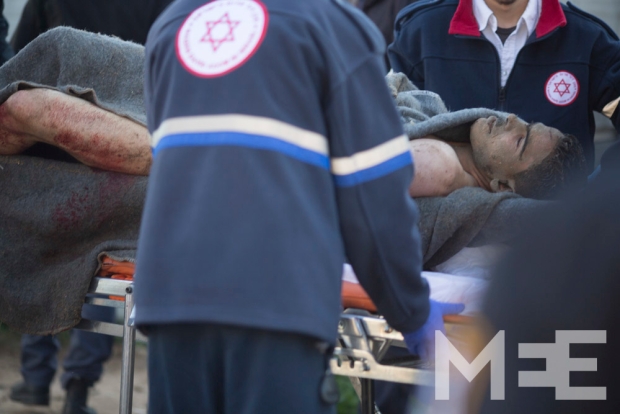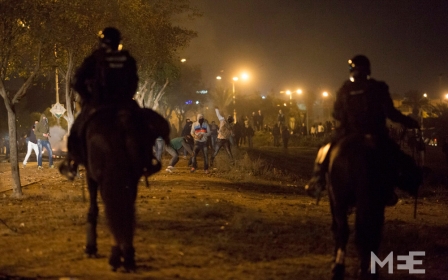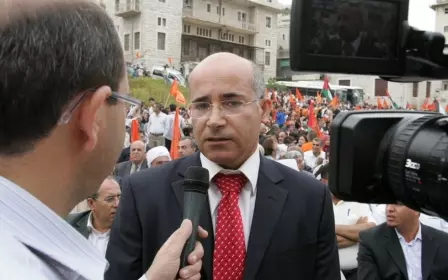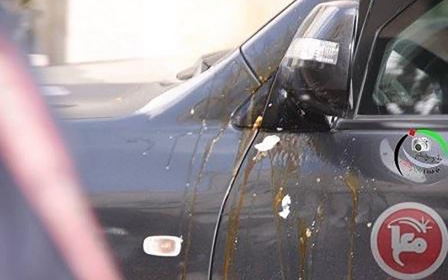Mass stabbing in Israel's Tel Aviv injures up to 12
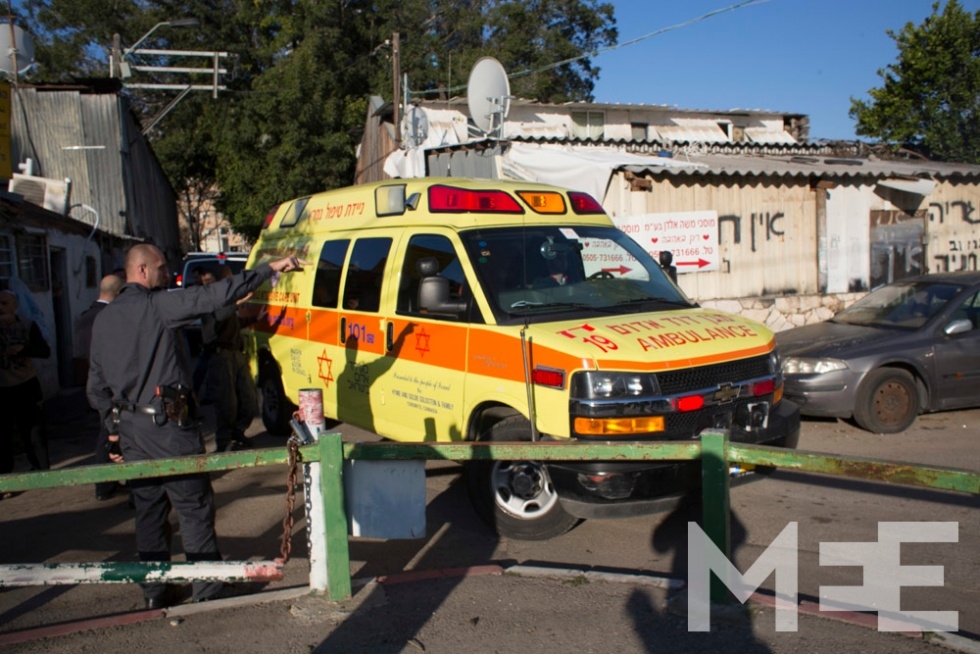
At least 9 Israelis were injured in a mass stabbing attack on a bus in Tel Aviv on Wednesday morning, medical sources told MEE.
A Palestinian suspect, a 23-year old man from the West Bank town of Tulkarm, was shot in the leg and subsequently arrested.
Tel Aviv is Israel’s second most populous city, and the attack hit as rush-hour commuters packed out municipal buses on the way to work.
A spokesperson for the Israeli police said five people sustained moderate to serious injuries, while another four received light injuries.
Israel’s public radio station later put the number of injured as high as 15. However, medical sources told MEE that 19 people were admitted for treatment, although this included several patients who were treated for shock.
Dr Pini Halperin, from Tel Aviv's Ichilov hospital told MME:
“We received 19 people injure from the incident in the Bus in Tel Aviv this morning.
"Three were severely injured, and two of them are still in this condition. Two more are in moderate condition, and the rest of [were treated] for light injuries.
“The ones that were severely injured are not fighting for their lives, but they are still hooked up to an artificial respirator, and are suffering from internal bleeding, caused by the stabbing. The bus driver sustained severe injuries."
Victims of the attack were found scattered in a 50-metre radius around the bus, which stopped during the attack – those who were able to run after being stabbed attempted to flee the scene as the stabbing went on.
Heli Suson, the nice of stabbed bus driver Herzl Biton, told MME:
"Before he lost his consciousness, he called his mother and told her he was injured. We were always afraid that something like this might happen, but I [know that would have fought back]. He is a hero.
"My uncle always told us that if he sees suspicious people, he forces them to get out of the bus."
The foreign press spokesperson for the Israeli police, Micky Rosenfeld, published a picture of forensics teams clad in full-body protective gear inspecting the blood-stained bus.
The suspected attacker was shot in the leg by an officer from the Israeli Prison Service, who was escorting a detainee to court nearby.
The man was handcuffed and taken to a nearby hospital for treatment and further investigation.
The attacker was named as Hamza Muhammed Hassan Matrouk, who does not have links to any militant or political group - he admitted to the stabbings during police questioning.
During the interrogation, he later told police he had perpetrated the attack "because of Operation Protective Edge," the 51-day military onslaught launched by the Israeli military on the Gaza Strip last summer.
Israel's Shin Bet security services released a statement saying Matrouk had been urged on to commit the crime by watching "extremist videos".
According to Shin Bet, Matrouk left his West Bank hometown of Tulkarm on Wednesday morning, armed with a knife, and entered Israeli territory without the entrance pass Palestinians usually have to show.
Matrouk's mother, Khaula Kaabi, was arrested by Israeli security services later on Wednesday, Palestinian news sites reported.
In a video circulated by Israeli news sites, the attacker is seen among a group of people running away from the site - he can be seen stabbing one of them in the arm as they run away, before attempting to flee the scene himself.
No Palestinian group has yet claimed responsibility for the attack.
However, a spokesperson for the Hamas movement said the mass stabbing was “heroic and brave”.
Izzat al-Rishq, a member of the movement’s political wing, added that the attack was a “natural response to the crimes of the [Israeli] occupation”.
Translation: The stabbing attack by a freedom fighter against the Zionists in Tel Aviv is a heroic and brave operation… It is a natural response to the crimes of the occupation and its terrorism against our people.
Netanyahu blames Abbas for 'venomous incitement against the Jews'
Israeli Prime Minister Benjamin Netanyahu held the Palestinian Authority, headed by Mahmoud Abbas, directly responsible for the attack, which he said was a direct result of the body's "venomous incitement against the Jews and their state".
Linking Wednesday's attacks to earlier murders in France, when four people were killed in a kosher supermarket on 9 January, Netanyahu said "the same terror tries to hurt us in Paris, Brussels and everywhere".
"Hamas, Abbas's partners in unity government, hurried to welcome this act - the same Hamas that announced it will sue Israel in the ICC," Netanyahu added.
His comments were a response to a recent decision by Palestine to join the International Criminal Court, a move that will allow Israel to be investigated by the court for alleged war crimes.
"Abbas is responsible for both the dangerous incitement and the Hague tribunal".
A host of other Israeli politicians, including Netanyahu's Foreign Minister Avigdor Liebermann, with whom he has been in open disagreement on key issues in recent weeks, were also quick to blame Palestinian political leaders for the attack.
"Those behind the Tel Aviv attacks stand [also] behind attacks in Jerusalem: Abu Mazen [Palestinian Authority President Mahmoud Abbas]...[Israeli Arab MP] Haneen Zoabi, [Israeli Arab MP] Ahmed Tibi...and their partners," Liebermann said on Wednesday morning, before Netanyahu made his comment.
"It's all part of the same process of undermining Israel's right to exist as a Jewish state".
As Israel gears up for snap elections in March, others used the attack to highlight perceived failings in the country's security system.
Isaac Herzog, head of the opposition Labour Party, condemned the attack, saying that "there is no sense of security for Israeli citizens - not in Jerusalem, Gaza, Tel Aviv".
"We will not accept a situation in which Israeli citizens cannot safely travel on public transportation".
The attack was also denounced by the US embassy in Israel, which issued a statement condemning the "deplorable terrorist attack".
Tel Aviv residents, however, expressed mixed feelings about the attack.
Rivka Cohen, a resident, told MME: "We want peace but there is no partner to speak with, and it a pity that innocent people that just want to get to their work place, get hurt.
"I feel that situation is getting worst, we saw stabbing and [road] attacks in Jerusalem. I don't think it’s the way to manage a country.
"We can live here together both the Israelis and the Palestinians in one land, it is possible to have two states but not with Abu Mazan [Palestinian President Mahmoud Abbas] because he is a terrorist."
But another resident, Dudi Levi, said that the recent string of attacks and incidents did not amount to an escalation in his eyes.
"I don't feel the situation is getting worst, we are used to this," he said. "Here in Israel we are getting excited about the snow, and in Europe they are getting excited about the recent terror attack. But here it is the opposite, we are used to terror attacks."
"But I felt bad this morning when I heard people got injured. You insecure and you know that Tel Avi will be empty because people will be afraid to go on buses," he added.
Mass arrests and continued unrest in the Negev
Security is now heightened in the area as police patrol the streets, fearful of further attack after reports that the 23-year old attacker entered Israel “illegally”.
Security services carried out a wave of arrests in the West Bank on Wednesday morning, although it was not immediately clear if the raids were connected to the Tel Aviv stabbings.
Some 18 people were arrested from the West Bank towns of Nablus and Hebron.
Eyewitnesses in Nablus, a small town in the northern West Bank, told Palestinian news site Palestine Today that hundreds of Israeli troops had carried out house-to-house raids in what they called the biggest wave of arrests for years.
Among those detained were 15-year old Abdullah Haribet and Alaa al-Titi, a journalist with satellite news channel al-Aqsa.
Titi was previously summoned to meet with Israeli security services in early January, after his Nablus home was searched.
Relations between Israelis and Palestinians have been at breaking point for months.
Tensions were at boiling-point late last year after Israel’s 51-day military onslaught on the Gaza Strip.
A spate of lone-wolf attacks launched within Israeli territory, including stabbings and car attacks, broke out in November following restrictions placed on the right of Muslim worshippers to pray at al-Aqsa Mosque, the ancient Jerusalem site holy to Christians, Muslims and Jews, who call it Temple Mount.
The attacks sparked fears of a third intifada, or Palestinian uprising – however, the situation has been relatively calm so far this year, with sporadic attacks inside Israeli territory.
Israeli police said the most recent such attack occurred two weeks ago, when a man was stabbed in the back with a screwdriver in Jerusalem.
A police spokesperson said they were investigating the screwdriver stabbing as a “terror” attack – however, the attacker fled the scene, and no suspect has since been positively identified.
Outside Israel’s major cities, however, tensions have spilled over into violence during the past week.
In Rahat, a town in the Negev desert home to a Bedouin-majority population of some 40,000, a man was injured on Tuesday night when he was run over by an Israeli police car during fierce clashes.
Thousands of Bedouin citizens of Israel had taken to the streets to protest the killing of two townspeople by Israeli police within a week.
Dozens of people suffered temporary asphyxiation after police fired teargas to disperse the demonstrators, Anadolu Agency reported.
Protesters responded by throwing stones and petrol bombs, Israeli army radio reported on Tuesday night.
Middle East Eye propose une couverture et une analyse indépendantes et incomparables du Moyen-Orient, de l’Afrique du Nord et d’autres régions du monde. Pour en savoir plus sur la reprise de ce contenu et les frais qui s’appliquent, veuillez remplir ce formulaire [en anglais]. Pour en savoir plus sur MEE, cliquez ici [en anglais].


